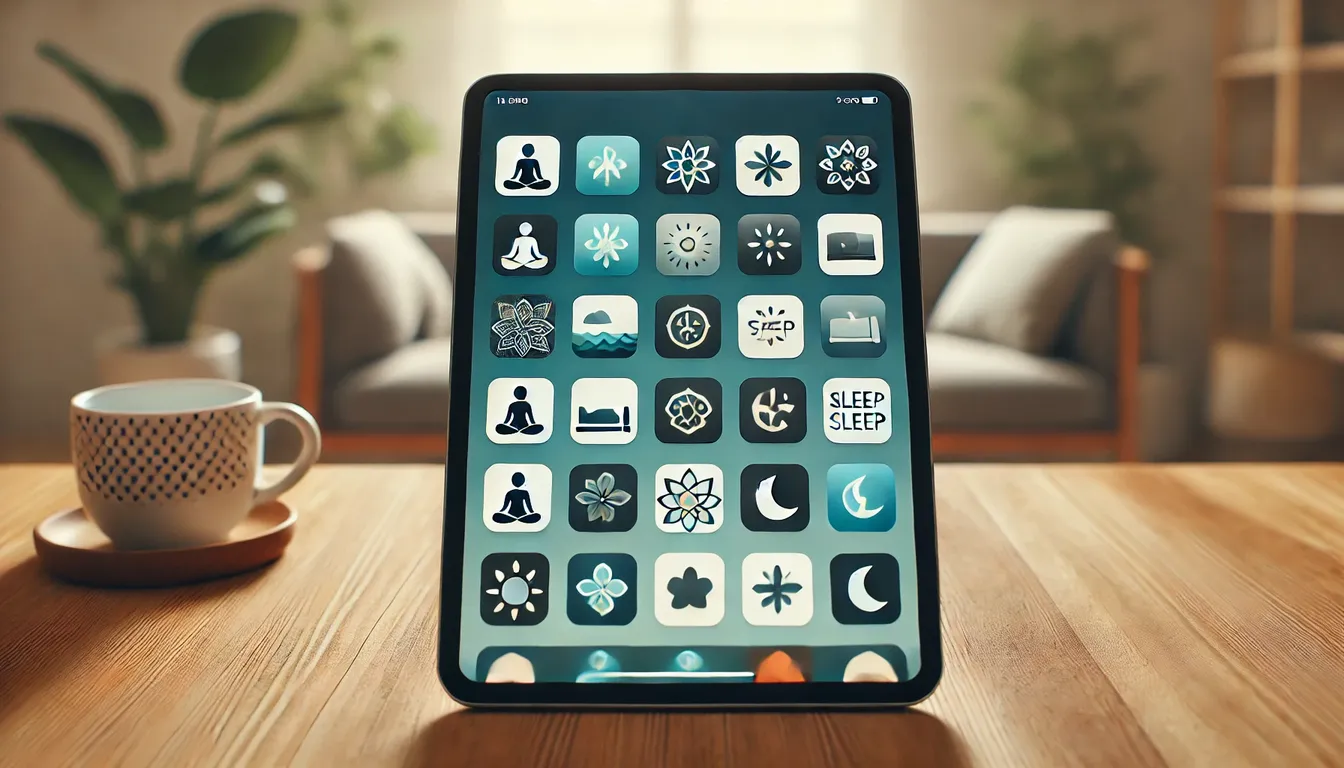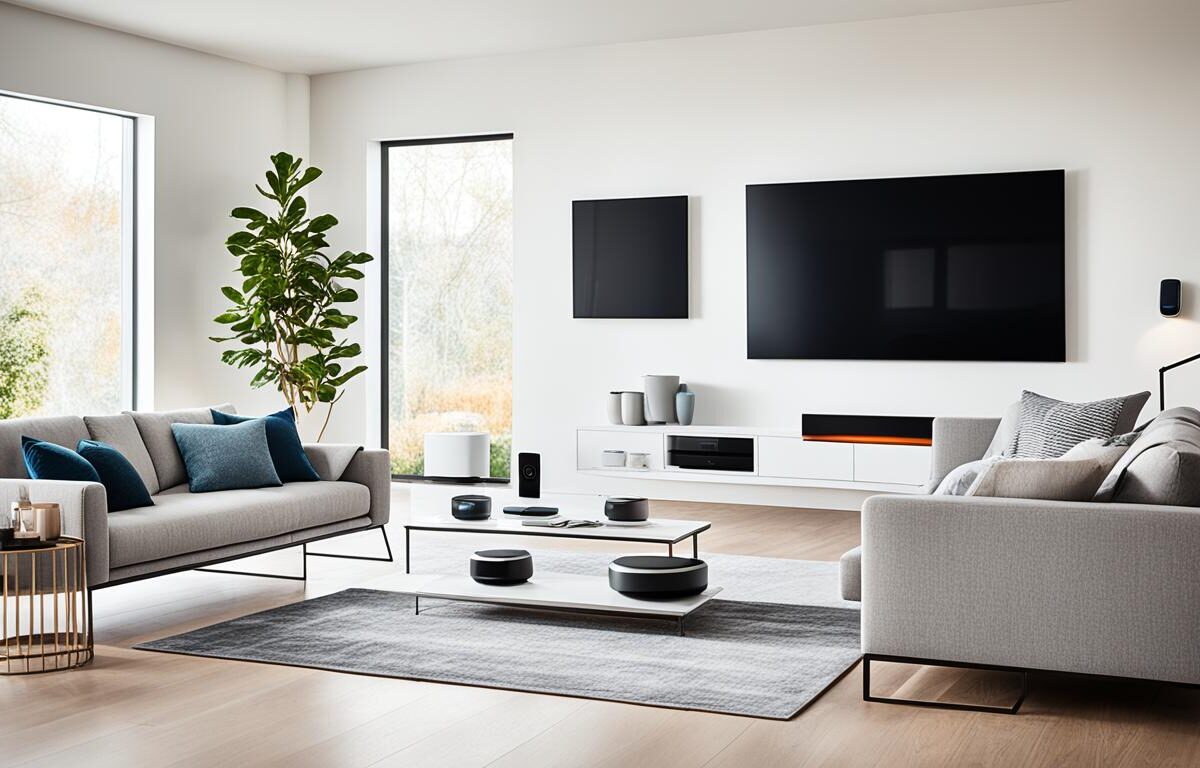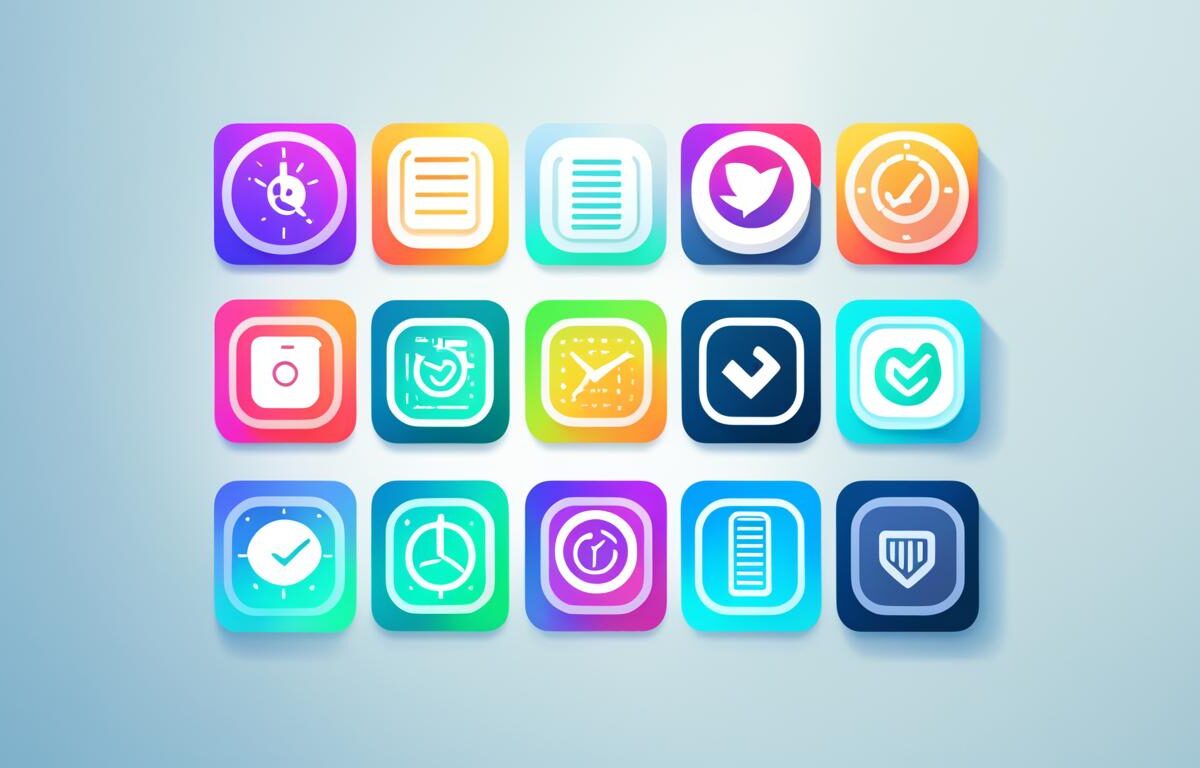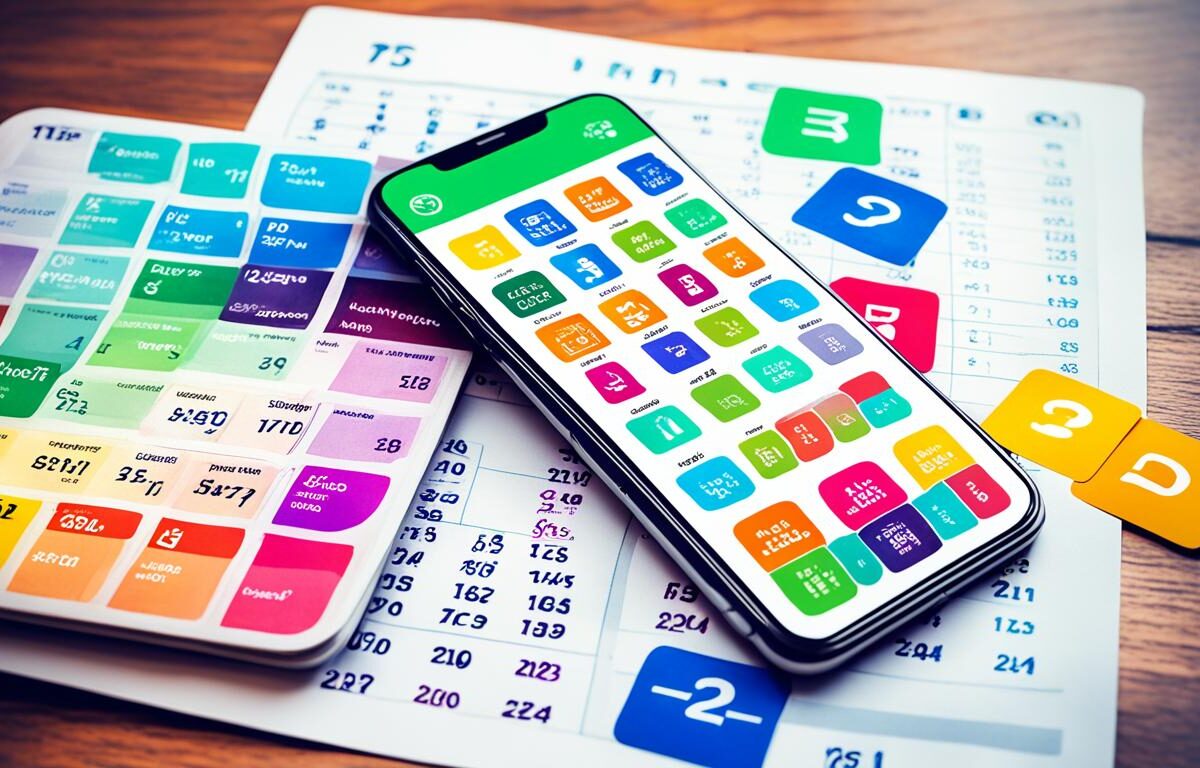Introduction to Meditation Apps
Feeling stressed? You’re not alone. Many struggle to find time to relax. Meditation apps are here to help. They bring mindfulness to your fingertips, helping you de-stress and focus from home. We’ll explore top meditation apps, their features, and help you pick the right one for you.
The Rising Need for Meditation in Today’s Fast-Paced World
Our minds are always busy with notifications and emails. We check our phones almost 100 times a day. This leaves little time for mental rest. Meditation apps are popular because they offer a way to unplug and recharge.

Why Stress Management is Crucial Today
Stress is a serious health issue. It affects sleep, mood, and overall well-being. Chronic stress can lead to anxiety, depression, and heart disease. Finding ways to manage stress is key to a healthy life. Meditation apps are a convenient solution.
How Meditation Apps Make It Easier to Relax
Meditation apps are your personal coach in your pocket. They’re flexible, allowing you to meditate anywhere, anytime. They offer guided sessions and breathing exercises to calm your mind quickly.
Benefits of Using Meditation Apps
Meditation apps offer more than just guided meditations. They make mindfulness accessible, overcoming common barriers like time or lack of guidance.
Convenience and Accessibility
These apps let you practice mindfulness on your terms. They’re available anytime, perfect for busy lives. You can meditate in short bursts, fitting it into your schedule.
Personalized Meditation Sessions
Many apps offer meditations tailored to your mood or goals. They ensure you get the most from your practice. Some even suggest sessions based on your current feelings.
Progress Tracking and Motivation
Apps track your progress and offer reminders and motivational messages. This keeps you engaged and motivated to meditate regularly.
How to Choose the Right Meditation App for You
Choosing the right app depends on your goals and preferences. Consider the features that matter to you. Here are some key factors:
Features to Look For
When picking a meditation app, focus on features that enhance your experience. Consider whether you prefer guided or unguided meditations and the length of sessions. Here are some important features to think about:

Variety of Meditation Techniques
Look for apps with many meditation styles like mindfulness and loving-kindness. This keeps your practice interesting and fun. Having many options helps you avoid getting bored.
User-Friendly Interface
An app should be easy to use. You shouldn’t get stressed finding the right session. A simple design makes a big difference in how often you use it.
Integration with Other Health Apps
Some apps work with fitness and health apps. This lets you track your overall wellness in one place. It combines physical and mental health for a full wellness approach.
Pricing Models and Free Trials
Apps may be free or require a subscription. Try free versions or trials to find the best one for you. The app you choose should be one you enjoy using.
Top Meditation Apps to Help You De-Stress
Let’s look at the best meditation apps for stress relief.
Calm
Calm is very popular for its beautiful design and soothing sounds. It has guided meditations, sleep stories, and breathing exercises. It’s great for both beginners and experts.
It’s famous for “Sleep Stories” with voices like Matthew McConaughey and Idris Elba. Calm has millions of downloads and high ratings for its variety and quality.
The daily guided sessions, “The Daily Calm,” are perfect for a mindfulness routine. It’s a great app for anyone wanting to try different meditation styles.
Headspace
Headspace is fun and friendly for meditation. It uses animations and simple guidance, ideal for beginners. It has courses on stress, anxiety, and sleep, and even programs for kids and families.
Users like the structured programs and friendly tone. It’s great for those new to meditation, making it easy to start. The app’s visuals and animations make meditation enjoyable and fun.
Insight Timer
Insight Timer has a huge library of free meditations. It also has talks from experts. You can customize sessions to fit your needs.
People love the community and variety of content. It’s perfect for those who like unguided meditation and want a community feel.
Breethe
Breethe offers a wide range of mindfulness content. It covers meditation, stress reduction, self-development, and sleep improvement. It has topics for different needs.
The app is praised for its design and library. Some say it’s best for those wanting to explore mindfulness beyond meditation. It also has podcasts, music, and nature sounds for relaxation.
Simple Habit
Simple Habit was made by a Harvard psychologist for busy people. It has 5-minute meditations for waking up, commuting, or before sleep. It also has content for stress relief and wellness coaching.
People like the quick sessions that fit into their busy lives. It’s perfect for those who think they’re too busy to meditate. The app is great for both beginners and those who meditate often.
Lesser-Known Meditation Apps Worth Trying
While big names get attention, some lesser-known apps are great too. They offer a fresh take on meditation.
MyLife Meditation
This app checks in daily to suggest meditations based on how you feel. It’s ideal for those who want a personalized experience. MyLife Meditation has short sessions that are perfect for quick check-ins.
Smiling Mind
Smiling Mind was made by psychologists and is great for kids and adults. It’s easy to use and helps build healthy habits. It’s often used in schools and workplaces to improve mental well-being.
Ten Percent Happier
Ten Percent Happier is for skeptics who want practical meditation tips. It has simple instructions and is curated by mindfulness experts. The app is great for those who are analytical about meditation.
Aura
Aura is a popular app for its personalized mindfulness approach. It offers daily micro-meditations that fit into a busy schedule. Aura uses AI to customize sessions based on your feedback, making it perfect for those who want something tailored to their emotional state.
Meditation Apps for Specific Needs
There are apps for everyone, whether you’re a beginner, need better sleep, or are an advanced meditator. Let’s explore which apps fit your needs to find the perfect one.
Apps for Beginners
Headspace and Calm are great for beginners with easy-to-follow instructions and courses. They have structured programs and interfaces that make meditation easy to start. These apps guide you through the basics of meditation, making it fun and engaging.
Apps for Sleep and Relaxation

Calm and Insight Timer have sleep stories and soothing sounds for relaxation before bed. They’re perfect for those with insomnia or restless nights. Calm’s Sleep Stories combine narration and music to help you sleep. Insight Timer offers a wide variety of guided meditations and music for sleep.
Apps for Advanced Meditators
Insight Timer and Ten Percent Happier are great for those who meditate a lot. They have deep practices, silent meditations, and talks from experts. These apps offer a lot of content for those who want to learn more.
Ten Percent Happier also has courses and interviews with experts. It explores how mindfulness and psychology work together. This is perfect for those who like to think deeply about meditation.
Apps for Specific Demographics
Some apps are made for certain groups, like kids, teens, or stressed-out workers.
- Smiling Mind is perfect for kids and teens. It’s used in schools and has meditations for their age group. It helps them manage their feelings.
- Simple Habit and Breethe are great for busy professionals. They have short meditations for different situations, like before a meeting or during a commute.
The Science Behind Meditation Apps
Do these apps really help? Yes, they do. There’s science behind how they can reduce stress and improve well-being. Learning about the psychology and neuroscience behind them can motivate you to use them more.
How Technology Enhances Mindfulness
Meditation apps use tech to make meditation better. They have features like binaural beats and nature sounds. These help you relax and make meditation more effective.
They also use AI to suggest meditations based on what you like and how you’re feeling. This makes the experience more personal and fun. Technology helps track your progress and adapt the sessions to you.
This tech lets you see how you’re doing over time. It tracks things like how often you meditate and your heart rate. This feedback keeps you motivated and informed.
The Role of Guided Meditation in Reducing Stress
Guided meditation is great for beginners and those with anxiety. It gives step-by-step instructions to calm your mind and relax. Studies show it can lower stress by focusing your mind on the present.
It also helps you stay focused and avoid distractions. With a guide, you can keep your mind on the meditation. Regular guided meditation can improve your emotional control, focus, and overall calmness.
These benefits can lead to better mental and physical health. You might feel less anxious and have lower blood pressure.
The Benefits of Mindfulness Practices Offered by Apps

Meditation apps do more than just reduce stress. They can improve focus, creativity, and emotional intelligence. Let’s look at some more benefits:
- Improved Sleep Quality: Apps like Calm and Insight Timer have specific content aimed at helping users achieve better sleep, which is crucial for overall health.
- Enhanced Focus and Concentration: Many meditation practices included in these apps, such as mindfulness and breath awareness, help users develop a greater ability to concentrate and stay focused. This can be especially beneficial in a work or study environment.
- Emotional Regulation: By practicing regularly, users learn to manage their emotions better, respond rather than react to stressors, and cultivate a more balanced emotional state. Apps like Ten Percent Happier offer content that combines mindfulness with insights from psychology, providing tools for effective emotional management.
- Increased Self-Awareness: Meditation apps guide users to reflect on their thoughts and feelings, promoting greater self-awareness. This is particularly helpful in recognizing negative patterns and developing healthier habits.
How to Maximize the Benefits of Meditation Apps
While meditation apps provide an excellent starting point, there are a few tips to help you get the most out of them. Consistency is key, so aim to use the app daily, even if it’s just for five minutes. Remember, it’s not about how long you meditate but how consistently you practice.
Set a regular time for meditation, like first thing in the morning or right before bed, to build a routine. Many apps offer reminders and streak tracking to help with this. You can also explore different types of meditation—such as mindfulness, loving-kindness, or body scan—to see what resonates most with you.
Don’t be afraid to mix things up. If you feel like you’re in a rut, try a different app or explore new content within your favorite app. Keeping your practice fresh and varied can help you stay motivated and engaged over the long term. Some users benefit from combining different apps based on their needs, such as using Calm for sleep and Headspace for daily mindfulness practices.
Overcoming Common Barriers to Meditation
Despite the many benefits of meditation, some people find it challenging to get started or maintain consistency. Here are some common barriers and tips for overcoming them:
- Feeling Too Busy: Meditation doesn’t have to take a lot of time. Apps like Simple Habit and MyLife Meditation offer quick sessions that can easily fit into even the busiest schedules.
- Struggling with Focus: Guided meditation can help. These apps provide a gentle voice to guide you through your meditation, making it easier to stay focused.
Building a Sustainable Meditation Practice with Apps
Start small and be patient when building a meditation habit. Use apps for reminders, support, and tracking progress. Over time, you’ll see positive changes in stress, relationships, and life challenges.
Combining Apps for a Comprehensive Approach
Don’t limit yourself to one app. Mix and match apps for a full meditation experience. For example, use Calm for sleep, Headspace for mindfulness, and Insight Timer for community sessions and deep talks.
Conclusion
Meditation apps have changed how we care for our minds. They make meditation easy, affordable, and convenient. Whether you’re new or experienced, there’s an app for you. They offer personalized sessions, sleep stories, community support, and progress tracking.
So, why not try them out? A few minutes of mindfulness can calm you in a busy world. Investing in your mental health today can lead to a better tomorrow.
Frequently Asked Questions (FAQs)
Are meditation apps effective for stress relief?
Yes, they are very effective. Guided sessions help you focus, breathe, and relax. This reduces anxiety and promotes calmness. Many users see improved mood, better sleep, and less stress.
How often should I use a meditation app?
Consistency is key. Aim for daily use, even for a few minutes. This helps build mindfulness and reduces stress. Find a routine that works for you and stick to it.
Are there any free meditation apps worth trying?
Absolutely! Insight Timer, Smiling Mind, and MyLife Meditation offer great free options. They provide quality content without a subscription, making them accessible to all.
What features should I prioritize in a meditation app?
Look for variety in techniques, easy navigation, customization, and progress tracking. Consider apps with sleep stories, breathing exercises, or community support. The best app keeps you motivated with reminders, streak tracking, and various meditation styles.
Can meditation apps replace in-person meditation classes?
Apps are convenient but may not replace in-person classes for personalized feedback and community. They’re great for starting or maintaining a practice. Apps offer flexibility and variety, while classes provide a deeper experience.
What should I do if I find it hard to meditate consistently?
Start with small goals and use reminders to meditate daily. Joining a community or finding a buddy can help. Even a few minutes a day is beneficial. Begin with short sessions and increase time as you get more comfortable. Apps like Simple Habit or Aura are great for consistency.
Using these meditation apps is a step towards better mental health and well-being. It’s a gift to yourself to practice mindfulness. Enjoy a calmer, more centered life. The journey to stress relief and a more mindful life begins with a single breath—and a tap on your screen.
Looking for relaxation, better sleep, or a deeper understanding of mindfulness? The right meditation app is waiting for you. Start exploring, and discover the transformative power of meditation today.







